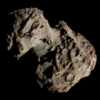C/2018 N2 (ASASSN)
The topic of this article may not meet Wikipedia's notability guideline for astronomical objects. (November 2024) |
This article is an orphan, as no other articles link to it. Please introduce links to this page from related articles; try the Find link tool for suggestions. (November 2024) |
 C/2018 N2 photographed from the Zwicky Transient Facility on 11 November 2019 | |
| Discovery[1] | |
|---|---|
| Discovered by | All Sky Automated Survey for SuperNovae (ASAS-SN) |
| Discovery site | Cerro Tololo Observatory, Chile |
| Discovery date | 7 July 2018 |
| Designations | |
| CK18N020 | |
| Orbital characteristics[2] | |
| Epoch | 26 February 2020 (JD 2458905.5) |
| Observation arc | 1,421 days (3.89 years) |
| Number of observations | 4653 |
| Perihelion | 3.125 AU |
| Semi-major axis | –17,021.93 AU |
| Eccentricity | 1.00018 |
| Inclination | 77.530° |
| 25.258° | |
| Argument of periapsis | 24.397° |
| Last perihelion | 10 November 2019 |
| TJupiter | 0.474 |
| Earth MOID | 2.1943 AU |
| Jupiter MOID | 1.6361 AU |
| Physical characteristics | |
| Comet total magnitude (M1) | 9.6 |
| 11.0 (2019 apparition) | |
C/2018 N2 (ASASSN) is the second of two comets discovered by the All Sky Automated Survey for SuperNovae after C/2017 O1. It is a hyperbolic comet that reached perihelion in November 2019, and as a result, it may never return to the inner Solar System.
Discovery and observation
[edit]The comet was first spotted as a magnitude 16.4 object by the ASAS-SN survey from images taken at the Cerro Tololo Observatory's 14-cm "Cassius" telescope between 7–11 July 2018.[3][4] It made its closest approach to Earth on 19 October 2019 at a distance of 205 million mi (330 million km) before reaching perihelion on 11 November 2019.[5][6] Although it did not go closer than 3.12 AU from the Sun at perihelion, observations of the comet did show some significant signs of activity, including a dust tail forming around July 2019.[7] It was last observed as a magnitude 20+ object on May 28, 2022.[2]
See also
[edit]References
[edit]- ^ "MPEC 2018-O01: COMET C/2018 N2 (ASASSN)". Minor Planet Electronic Circular. Minor Planet Center. 16 July 2018. Retrieved 14 November 2024.
- ^ a b "C/2018 N2 (ASASSN) – JPL Small-Body Database Lookup". ssd.jpl.nasa.gov. Jet Propulsion Laboratory. Retrieved 14 November 2024.
- ^ "Comet C/2018 N2 (ASASSN)". Al Sadeem Astronomy. Retrieved 14 November 2024.
- ^ S. Yoshida. "C/2018 N2 ( ASASSN )". www.aerith.net. Retrieved 14 November 2024.
- ^ G. van Buitenen. "C/2018 N2 (ASASSN)". astro.vanbuitenen.nl. Retrieved 14 November 2024.
- ^ M. Olason (24 February 2021). "Comet C/2018 N2 (ASASSN)". Sky & Telescope. Retrieved 14 November 2024.
- ^ P. Chambó (12 July 2019). "Comet C/2018 N2 (ASASSN)". www.cometografia.es (in Spanish). Retrieved 14 November 2024.


